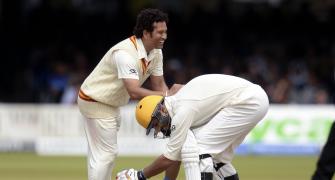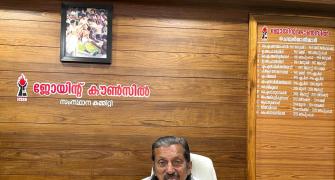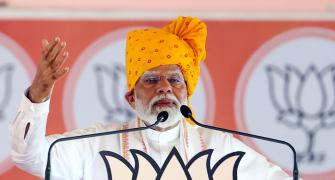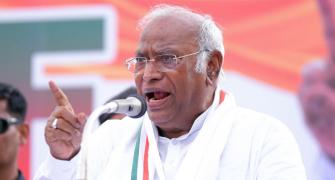It took a full five years. More than 200 witnesses testified. At the end on October 31, the sentence was pronounced.
Pakistan-based Lashkar-e-Tayiba terrorist Mohammad Arif alias Ashfaq was sentenced to death in the December 2000 Red Fort attack case.
Judge O P Saini in his wisdom thinks that Ashfaq waged a war against the state.
Like the story of every convict, the story of Ashfaq is also full of truths, half-truths and plain lies.
When he was arrested in December 2000, he told a television channel that he was influenced by the Pakistan government propaganda telecast on PTV.
He not only accepted his crime of attacking Red Fort but also said how he entered India and how Pakistan's Inter State Intelligence motivates and trains people like him.
But at the end of his trial, we got to see a completely different Ashfaq.
Under Section 313 of the Criminal Procedural Code, judges question the accused before declaring judgments. It's a one-on-one talk between the judge and the accused and is sacrosanct in the eyes of the law.
Almost at the end of the trial, Judge Saini asked Ashfaq, "Do you want to say anything more?"
Ashfaq came out of with a story many Pakistanis, who have been tried in India, have resorted to in the past.
In a four-page reply that Judge Saini recorded, Ashfaq said: "I used to work for the Research and Analysis Wing since 1997. In the last days of June 2000 I had come to Katmandu to give some documents to Sanjeev Gupta.
"In Pakistan, there is a political party called the Pakhtoonmili Party, which RAW has been supporting for the past 30-35 years. Sagir Khan was a member of that party and he was arrested by the Pakistan police with my younger brother. I received this news in Katmandu. I spoke to Gupta in this regard. My cousin had also advised me not to return to Pakistan for the time being.
"Thereafter Gupta advised me to go to India and accompanied me up to Rauxol. I came to India by train. He gave me the address of Nain Singh and called him on the number 6834454 requesting him to accommodate me. Singh gave me a room in his house to stay. He advised me not to reveal my name and address to anyone. He asked me to pose as a resident of Jammu.
"Singh was a moneylender and I used to help in maintaining his accounts. After about one and a half month, I asked Nain Singh to get me a job as my money had run out.
"Thereafter, he helped me set up a computer centre. Nain Singh got some Rs 7 lakh through Gupta. He did not tell me anything about receiving this amount and whenever I used to question him, he used to duck the question.
"Thereafter I contacted my family and they asked me to speak to Gupta who told me that he had sent the money to Singh.
"When Gupta confronted Singh, he helped me open a bank account in HDFC Bank. I was interested in the business of cable networking, but Singh asked me to sit at the computer centre. My chequebook used to remain with Singh and he got only one cheque signed by me.
"Whenever I needed money, I had to take it from Nain Singh, that too only Rs 500 or 1,000 at a time.
"During Singh's son's birthday party, he introduced me to Inspector R S Bhasin and Inspector Ved Praksah.
"Thereafter, when I persisted in demanding my money from Singh, he used to get annoyed and ultimately got me involved in this case. Singh took advantage of the fact that I could not go back to Pakistan.
"On December 25 2000, Singh called me from computer centre to his house on the pretext that Bhasin and Ved Prakash needed some information from me and I accordingly came to his house.
"Those two were in plain clothes had come to my home in a white Maruti Zen. They took me to a flat in Lodhi Colony. There was a Sikh officer there also.
"They interrogated me about my background and then dropped me to Singh's house. Singh was not there but his wife said there was a call from my in-laws at Gazipur inviting me for dinner that evening. I tried to call my in-laws but could not get through.
"Thereafter I took a bus and reached the house of my in-laws. I asked them if they had called me to which they replied in the negative. I reached there around 8 pm and finished dinner by 10.
"A police party soon raided the house. We initially thought they were burglars since they had entered the house by scaling the wall. The cops threatened to shoot us if we spoke too much.
"Then the police brought my brother-in-law and me to Lodhi Colony. There they took my signatures on blank papers. Initially I was not willing to sign blank papers. But the policemen tortured me into doing it. They beat me up so badly that my legs, mouth and nose started bleeding. Next day I was taken to a hospital. I was made to change my clothes and they kept me in confinement.
"The police also kept my wife and in-laws confined in one room. The police told me that they were also tortured. I signed the papers only after this. I was produced before the doctor and I told doctor about the torture and he treated me. I was then produced before a lady judge and I told her too about my torture and she assured me that everything would be all right. Thereafter, I was presented before the media.
"While in confinement, Inspector Bhasin even tried to force me to divorce my wife but I refused. I don't know any of the accused present in the court now except my wife Rehmana Yusuf Farukhi.
"I am innocent and I have been implicated in this case simply because I am a Pakistani national. I was tortured in the jail at the instance of police for about three months. I was also attacked by fellow inmates."
This version of Ashfaq is just one side of the story, which Judge Saini has completely rejected. The judge believed the prosecution story that the attack was hatched at Nazir Ahmed Qasid's home in Kashmir and executed with help of other accused mainly Asfaq's wife Rehamana, Nazir's son Farooq Ahmed Qasid, Bagar Mohsin Baghwala and Sadaqat Ali.








